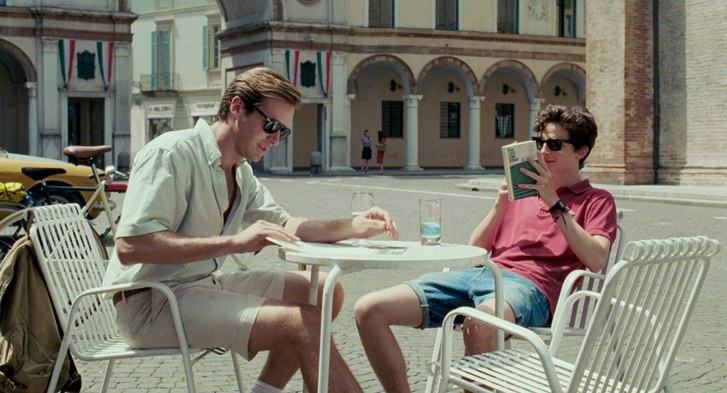Call Me By Your Name, this year’s Oscar winner for Best Adapted Screenplay, is an honest and moving portrayal of firsts. From first love to first heartbreak, the film invites us all to indulge in the nostalgia of how significant the summer romances of our youth once were. Faithfully adapted from André Aciman’s original novel of the same name, director Luca Guadagnino and screenwriter James Ivory have masterfully crafted a story of love that nearly anyone can find familiar.
The film follows Elio Perlman (played by Timothée Chalamet), a cheeky and intelligent 17-year-old living “somewhere in Northern Italy” in 1983. Elio is a layered character; he seamlessly blends together English, Italian, and French, transcribes classical music by ear in his free time, and enjoys playing the piano and reading. In their Italian vacation home, the Perlman family welcomes a graduate student every summer to study under Elio’s father, a classicist and scholar of archaeology. But this summer’s house guest isn’t like the ones who preceded him. Oliver (played by Armie Hammer) is a 24-year-old American graduate student who will alter Elio’s life immeasurably.
The two don’t exactly get along at first. They struggle to find themselves on the same page, and Elio even vocalizes his distaste shortly after Oliver’s arrival. “What if I grow to hate him?” Elio asks his mother. “We’ll have to put up with him for six long weeks,” she answers. As it turns out, six long weeks won’t be long enough.
Oliver and Elio begin an interesting friendship by communicating through music, literature, and the activities a summer in northern Italy offers: bike rides into town, swimming in the river, lying out in the sun. The film’s nostalgic quality brings us back to a time where human connections occurred more naturally and organically. With barely any distractors, Oliver and Elio are given the chance to understand each other in isolated (and often incredibly picturesque) scenarios. We then begin to witness a game of seduction – one filled with back and forth, give and take, certainty and uncertainty. Elio, both aloof yet desperate for approval, bounces between ignoring Oliver for the remainder of his stay, and giving in to his increasingly obvious attraction to him.

Photo: The New Yorker
Unlike the romantic narrative formulas we are used to, Elio and Oliver’s relationship unfolds slowly and unevenly. Guadagnino’s directing style gives the audience a glimpse into the agonizingly slow days that pass without any progress being made. Mirroring the impatience that plagues Elio, we sit through several repetitive scenes of sitting, reading, swimming, and biking, and are similarly impacted by any explicit or implicit signal Oliver and Elio exchange. After weeks of uncertainty, the pair give up on suppressing their desires for each other and give in to one of the most passionate love affairs we’ve seen on screen in a long time.
While sensuality is a prominent theme in the film, it does not exist alone. The film fixates not only on true love, but rather the all-consuming passion of love, the concept of the crush, and the inherently complex nature of desire. As a young adult, Elio attempts to understand his own sexuality through the lens of confusing external factors. He finds himself victim to constantly shifting desires; he is attracted to both Marzia and Oliver (albeit, perhaps unequally), and even gets intimate with a peach to find his answers. Among its many thematic dimensions, Call Me By Your Name touches on the inherently fluid nature of our sexualities and rejects binary notions of love.
But the most beautiful aspect of this film, perhaps, is the deliberate absence of any obstacles that often plague a gay romance. Unlike the bulk of queer romantic narratives, Oliver and Elio’s relationship is not disrupted or tinged by disapproving parents, hateful bystanders, or even the AIDS epidemic that would become apparent in years to come. In fact, the only antagonist in Call Me By Your Name is time. As Oliver and Elio sit on their balcony on one of their final nights together, they reflect on how much of the summer they had wasted navigating contradictory signals and internal conflicts. “Why didn’t you give me a sign?” Elio begs Oliver. The two men share one last getaway before Oliver departs, and in one of the most heartbreaking scenes, we watch them say goodbye without exchanging any words.
Elio’s father (played by Michael Stuhlbarg) delivers a profound monologue at the end of the film where he acknowledges the “beautiful friendship” Elio shared with Oliver. In a gesture of great empathy, Professor Perlman not only confirms that he was aware of the nature of their relationship, but that he even envied his son’s ability to dive into a place where he himself was once tempted, but hesitated. “I may have come close, but I never had what you two had,” he admits. Seeing his son in pain from Oliver’s departure, he implores Elio to not dismiss his feelings, but rather to embrace and see the beauty in hurting. “We rip out so much of ourselves to be cured of things faster,” he says, “that we go bankrupt by the age of thirty and have less to offer each time we start with someone new.” We must be open to suffering, even welcome it, because “to feel nothing so as to not feel anything – what a waste.”
Among its many lessons, Call Me By Your Name awakens us to the beauty that can exist in desperation and vulnerability. Not only does the story teach us to love hard, but it also encourages us to approach love openly and especially without the fear of rejection. Despite the film’s dreamy sequences, beautiful score, and passionately romantic plot, we aren’t rewarded with the conventional happy ending we’ve come to expect. Instead, we are left to contemplate what we learn from our experiences in love, what it means to desire, and how much we can grow by accepting the parts of ourselves we haven’t always understood.

